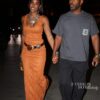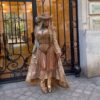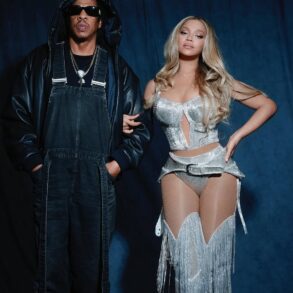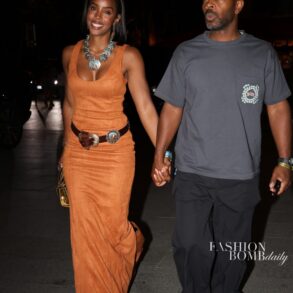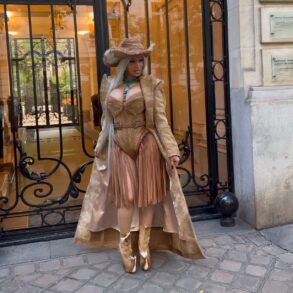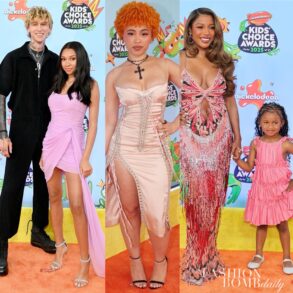COPENHAGEN — How do you dress for climate change?
Ask the Danes who powered through five days of runway shows and events amid rain, whipping winds and yoyo-ing temperatures at the spring 2024 edition of Copenhagen Fashion Week, which ran from Aug. 7-11.
Guests would often walk into a show venue with the weather feeling like a late November day and emerge 20 minutes later in the bright summer sunshine.
Danish designers took the surreal weather swings in their stride, though, going ahead with outdoor shows in the cold and rain. They simply wiped down seats, handed umbrellas to guests, and looked on the bright side.
“I love the gray-blue color of the sky,” said Cathrine Saks, pointing to the runway images from Saks Potts‘ beautiful spring 2024 collection, which featured gossamer ruffle-edged dresses, wide-legged jeans, and soft cotton polo shirts with a vintage feel.
Saks and her codesigner Barbara Potts had managed to photograph the models in between rain showers at the venue, a park overlooking the Baltic Sea with the Swedish coast in the distance.
The forecast may have been grim, but there was no way they were going to move the venue. Instead, they ordered a batch of umbrellas for guests.
“The place was very personal for Barbara and me. We met there when we were in kindergarten, and spent so much time here as children,” said Saks.
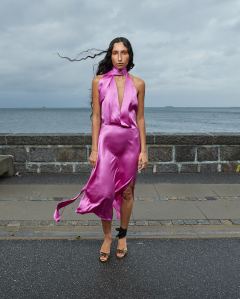
Saks Potts RTW spring 2024
James Cochrane
Guests, too, embraced the temperamental weather, armed themselves with umbrellas, trench coats, and chunky, colorful knits, and pulled boots over their suntanned legs. The weather was lovely in July, the month when most Danes take their summer holiday.
They wore cowboy boots in a rainbow of colors; knee-high styles with thick soles or chunky heels; and biker boots — and they walked tall.
Bruce Pask, men’s fashion director at Bergdorf Goodman, said the wet, fall-like weather did nothing to dampen the week, “with many designers still choosing to show ‘en plein air’ and attendees sporting umbrellas, anoraks and an upbeat can-do attitude.”
The can-do attitude was pervasive, with Copenhagen’s designers not only undeterred by the weather but also optimistic about the future. Once known for their extra-large volumes and floaty, flowery dresses many of them have been taking stock and moving on.
While the Danes’ whimsy and passion for bold color, pattern and embellishment is still going strong, silhouettes are slimmer, lengths are shorter, and denim — laser-printed, hand-dyed, distressed or embellished — is bigger than ever.
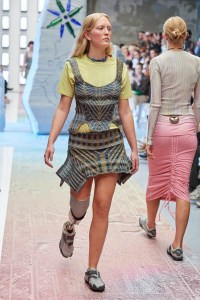
Paolina Russo RTW spring 2024
James Cochrane
The flowers are still out in force, but this season they came as fabric necklaces, belts or embellishments at OpéraSport; or laser-etched onto denim jackets and miniskirts at Paolina Russo; or freshly cut and pinned to the lapels of black tailored jackets at the menswear label Sunflower.
Pattern, texture and handwork came to the fore, too, with broderie anglaise dresses, and crocheted caps and tops at The Garment; shiny foil surfaces on trapeze dresses and coats at Stine Goya; and delicate Japanese quilt stitching on the dramatic coats at Helmstedt.
Given the weather, knitwear played a starring role, too. Leg warmers bounced back onto the runways at brands including Kernemilk, where designer Marie Mark paired them with high heels. She also gave bomber jackets ribbed knit collars and sleeves and whipped up sultry, off-the-shoulder sweaters.
Remain’s new creative director Martin Asbjørn hitched rounded, knitted statement sleeves to semi-sheer tops, while Paolina Russo’s standout collection featured swingy minidresses and other knits with a lenticular effect.
Paolina Russo was an LVMH and Woolmark Prize finalist this year, and won the inaugural Zalando Visionary Award at Copenhagen Fashion Week.
“We actually started by using a hand-knitting technique, which we later automated. It means we can do knits with different graphics and prints every season. It’s cool. The patterns disappear as you move,” said Russo, who codesigns the collection with Lucile Guilmard.
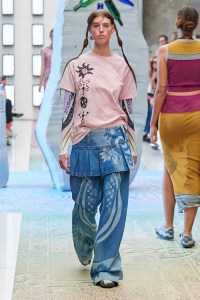
Paolina Russo RTW spring 2024
James Cochrane
Cecilie Bahnsen, who hosted a live concert with the Brodie Sessions and French singer-songwriter Suki at the start of Copenhagen Fashion Week, summed up the mood of her fellow designers. Her spring 2024 collection, which will show in Paris on Sept. 27, mirrors many of the trends that emerged this week.
During a preview at her Copenhagen studio, Bahnsen showed off skinny silk and nylon cardigans with ruching and rosette details and featherweight knitwear meant to be layered under dresses; pencil skirts and tops with puffy, sculptural shoulders.
All of her signature ruffles, ruching, smocking and bows were still there — but this time they’re adorning A-line knee-length skirts, or minis. Bahnsen added an embroidered flower to the back pocket of white, wide-legged jeans, and delicate embellishment to the back of a matching denim jacket.
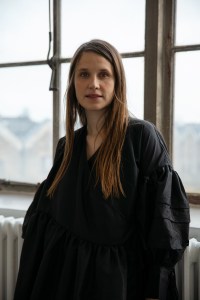
Cecilie Bahnsen
Bahnsen said she’s working toward “a more grown-up version” of the brand she launched in 2015.
“I’ve been trying to think about what’s next after all the volume, and how to keep things feminine and comfortable. I’m always thinking, ‘How do you wear this dress on a Monday? Or if you’re riding a bike?’” said Bahnsen, who made her name designing voluminous textured and embellished dresses with a retro, childlike edge.
For spring, she’s adding denim and more separates to the collection “so that customers can wear my dresses in their own, individual way.”
Helle Hestehave, who codesigns Baum und Pferdgarten with Rikke Baumgarten, is also moving on style-wise.
“For years we were well known for our floaty, romantic dresses, but right now, for us, it’s much more about the individual. Our look is about mixing vintage with clothes you’ve customized yourself and high-end brands,” she said.
Baum und Pferdgarten took inspiration from Copenhagen’s (normally sunny) summertime streets, and their mix of locals, tourists, sailors and sporty types.
The duo sent out navy blue sailor sweaters and blazers with white piping; short A-line skirts with thick, lacy leggings; and glittering silver sequin dresses and skirts, a nod to Copenhagen’s Little Mermaid bronze statue.
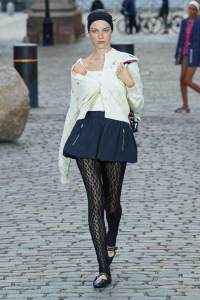
Baum und Pferdgarten RTW spring 2024
James Cochrane
Environment, and community, were top of mind for many designers, including Stine Goya and Ganni. Copenhagen Fashion Week is well-known for having raised the bar on sustainability and asks its designers to adhere to a strict series of standards around packaging, manufacturing, set design, production and working conditions.
Stine Goya and Ganni ran with those rules, taking a particularly creative approach to their runway sets.
Stine Goya used her family home as the backstage, applied for permission to close down her street and asked neighbors to help with the set design. They set up long tables and added their own place settings along with cabbages, tomatoes, loaves of bread, bunches of grapes and colored jelly mounds.
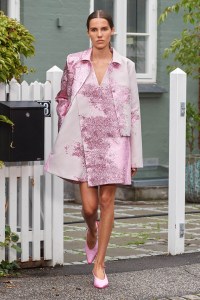
Stine Goya RTW spring 2024
James Cochrane
Goya called the collection Homecoming and sent models out of her front door dressed in floral shades, such as hot bougainvillea pink for a cutout sweater; cornflower blue for a trapeze dress; and wisteria purple for a lineup of sequin-covered coats and tops.
Ganni’s Ditte Reffstrup, instead, brought the outside in, tapping a specialist nursery to plant a series of trees on the runway. With the help of AI technology, the tall, lush trees “spoke” to the audience via loudspeakers, and told them not to worry — AI isn’t going to take anyone’s jobs away.
We’ll see about that.
AI technology also helped to choose the runway and finale music, having being fed information about the preferences of Ganni’s many social media followers. The bots even came up with a series of spring 2024 looks for Reffstrup to consider.
She took them into consideration, and then went her own way.
“We didn’t use the AI [design] concept at all, we just like idea of AI. Some people are very afraid of it, some find it super-helpful. I just wanted to use it as inspiration,” said Reffstrup, whose buzzy collection showcased jeans with sparkly embellishment down the sides; ruffle-edged knit skirts; cropped, off-the-shoulder sweaters and fun, clashing animal prints.
Retailers, some of whom also attended the newly-expanded CIFF and Revolver trade shows, said the week was full of fresh ideas.
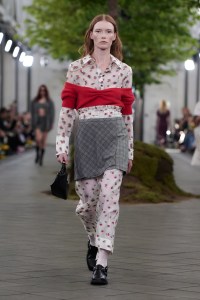
Ganni RTW spring 2024
Mathias Nordgren/Courtesy of Ganni
“The city has grown into an important stop on the season’s fashion circuit, with inventive, thoughtfully produced collections and emerging brands that have overcome the minimal Scandi-style label often associated with the region’s fashion,” said Pask of Bergdorf Goodman.
“The newly united and expanded CIFF and Revolver trade shows have amplified the value of the week, providing great scouting grounds and new discoveries in womenswear, beauty, and especially menswear categories, nicely highlighting emerging talents like Berner Kühl and Mark Kenly Domino Tan,” Pask added.
Tiffany Hsu, Mytheresa’s chief buying officer, said the Copenhagen showcase “brings a lot of fresh energy into European fashion. It is a bit more realxed and at ease than some of the other fashion weeks, and its clear focus on sustainability is another very important aspect. The brands showing there are mostly attractive to younger clients who are very fashion focused.“
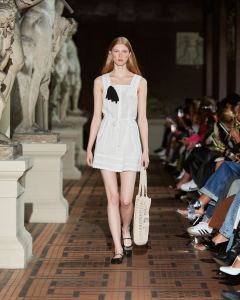
The Garment RTW spring 2024
James Cochrane
Hsu said that Ganni in particular stood out for its “ever more sophisticated” styles and “beautiful tailoring.” She added that Rotate, The Garment, Paolina Russo, TG Botanical and A. Roege Hove also showed impressive collections.
Laura Larbalestier, fashion director at Harvey Nichols Group, said the week offered “a good balance of solid collections and new talents. One of Copenhagen’s strengths is that the brands complement one another, and they all have a sense of cool, stylish practicality — from Ganni and Saks Potts to Helmstead and Skall Studio.”
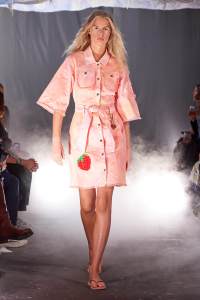
Helmstedt RTW spring 2024
James Cochrane
Larbalestier said Danish brands perform strongly at Harvey Nichols, with top sellers including Ganni, Rotate, Day Birger et Mikkelsen, Stine Goya, and Skall Studio.
There was action off the runway, too, with a clutch of new store openings. J.Lindeberg opened a flagship as did the fine jeweler Elhanati, whose new store, showroom and offices are near Saks Potts on Bredgade, an arty area of town.
Pask said he particularly likes Andersen Andersen, which recently opened “a vibrant second floor shop in a beautifully restored, landmark Arne Jacobsen building to showcase their signature, colorful fisherman knits sweaters and accessories.”
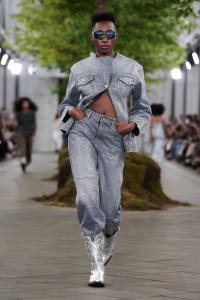
Ganni RTW spring 2024
Mathias Nordgren/Courtesy of Ganni
Local menswear collective Another Aspect has partnered with the Danish coffee brand La Cabra on a coffee bar inside their shop in the newly-hot Montergade area, which is also where the New York brand Sea hosted a cocktail during the week and opened a pop-up shop that will run until Aug. 19.
Danish brands and companies are also looking to expand and raise their profiles abroad. Tekla, the Danish fine linens and sleepwear brand which hosted a breakfast during the week, is planning to open its first outpost in London in the coming months.
The CIFF and Revolver trade shows will be hosting a sustainability-focused showroom on Mercer Street in New York from Sept. 7-9, highlighting 12-14 Danish brands. They are teaming with the Council of Fashion Designers of America on the project, which will take place at the start of New York Fashion Week.
This post was originally published on this site be sure to check out more of their content.


